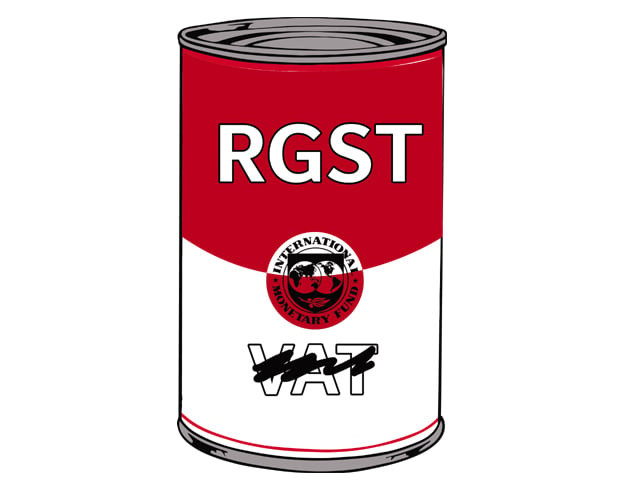Old wine, new bottle
The new bill carries only cosmetic changes from the withdrawn VAT bill.

In what appears to be a clever move, the government has tried to pass off the original VAT bill as RGST by adding nine more clauses and a dozen sub-sections to the older rejected version – primarily in an attempt to simplify its procedures and clear the ambiguities, according to the bill’s authors.
Moreover, the government has vowed to get it passed and implemented from January 1 under intense pressure from the International Monetary Fund.
The draft of the original VAT bill had been passed by the Senate’s and the National Assembly’s Standing Committees on Finance. But it was not approved by parliament after the business community threatened countrywide strikes.
The government’s failure to implement VAT from July 1 resulted in the IMF withholding $1.8 billion of the second loan tranche.
The key to the next possible IMF programme has also been taken away as the government cannot get it until the first one matures. And the first one will not be completed until the RGST and power sector reforms are implemented.
This next IMF programme is a must to pay back IMF loans, according to independent economists. The government has already started negotiations for the second programme, as admitted by Principal Economic Adviser, Saqib Sherani in September.
A compulsory documentation and withdrawal of exemptions on domestic sales of fertiliser, tractors, textiles, leather, sports goods, surgical instruments and carpets have become the bone of contention between the government and the business community.
The integrated Reformed GST also envisages taxing services in the federal capital territory and in provinces, subject to the provincial governments’ approval. However, just as it was in the past, the provinces are still not fully on board despite having made some progress on the issue.
The circumstances of the current RGST bill are worse than those in June 2010 when the government decided to withdraw the VAT and introduce the Reformed General Sales Tax bill.
The government’s main political allies, the MQM and the JUI, have publicly opposed the bill in contrast to the situation in June when the Senate Standing Committee on Finance, led by MQM Senator Ahmad Ali, had cleared the bill.
“This time the MQM will not budge from its stance, come what may, because the government has hit the poor man below the belt,” said Senator Ahmad Ali. He said that the Senate panel had earlier recommended that the government reduce the VAT rate to 12 per cent from the originally proposed 15 per cent and defer it for one year. But he says that now the MQM would not compromise even if the government reduced the rate ‘because times have changed’.
Some political pundits say that the government has been wasting time and that it is non-serious about the GST implementation. While others termed the move to defer the implementation to June as a political one.
“The government played it well in June when it bought time from the IMF as it had to choose between passing the federal budget or indulging in controversial debate on VAT. So it decided to do the most important job first,” said PML Senator Haroon Akhtar Khan, who is also a member of the Standing Committee on Finance.
However, being a businessman first and foremost he is wary of the extraordinary powers that the bill proposes to give to the Federal Board of Revenue to ensure the recovery of tax arrears. “The FBR is becoming draconian, as these powers will be detrimental and hurt the businesses,” said Haroon.
According to the bill, an FBR official can seize business premises, stop clearance of imported or manufactured goods, attach bank accounts and sell moveable or immovable property belonging to defaulters. On top of that the bill proposes imprisonment of up to three years for defaulters.
“The new Finance Minister, confused Finance Ministry, public pressure and hostile media compelled the government to withdraw the VAT in June,” said PPP Central Information Secretary, Fauzia Wahab and Chairperson of National Assembly Standing Committee on Finance.
She said that the government was serious about implementing the Reformed GST, as the country could not run well within the available fiscal space, a fact well understood by both the MQM and the PML-N. Fauzia admitted that nothing significant had changed in the GST bill except the name.
Published in The Express Tribune, November 13th, 2010.



















COMMENTS
Comments are moderated and generally will be posted if they are on-topic and not abusive.
For more information, please see our Comments FAQ